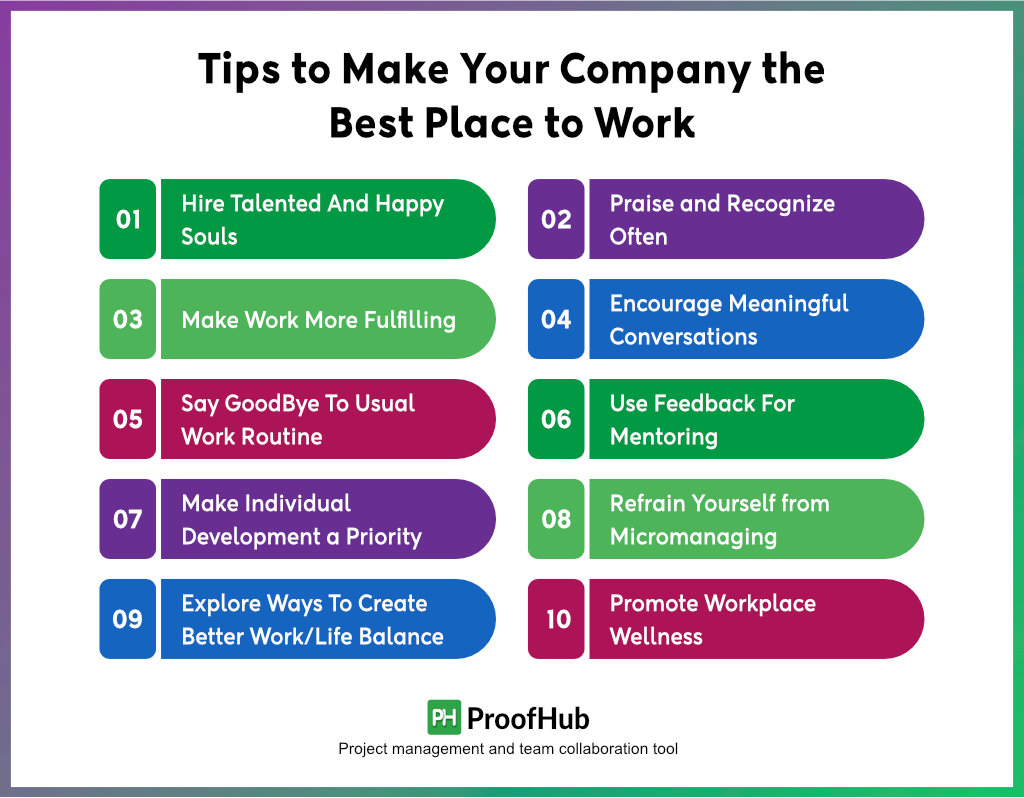The type of company culture you nurture in your office has an integral role to play in your business’s success. It affects nearly every aspect of your company. And that is why almost every business owner and project manager wants his/her workplace to come out as the “best place to work”.
There have been dozens of research studies that have clearly shown how having a positive work culture can help employees find the real value in their work and give it their best. However, cracking the code for building a happy work culture is difficult.
Mind-blowing stats: In Deloitte’s Global Human Capital Trends survey, 12 percent of the executives believe that their company is driving the right corporate culture and only 19 percent of executives believe that their companies have the right corporate culture.
A similar survey also reveals that over 90 percent of executives and 80 percent of employees agree to the fact that having a strong, positive workplace culture is important to a business’s overall success and productivity.
Keeping the above stats in mind, we’ve dedicated this post to give you a quick peek into the ideal corporate culture and make you familiar with the key qualities that can help you exhibit a strong culture in your own company.
Are you ready? Read on.
First, What does work culture mean?
A company’s work culture is its overall personality. It’s a combination of a variety of elements that create an intangible ecosystem where people can work to the best of their capabilities and creative skills.
Value, ethics, expectations, goals, workflow, task management, collaboration, feedback, and time management are some of the most essential elements that come together to create a positive, productive ambiance where employees can make a mark on their performance.
In a nutshell, work culture reflects the ideology of the organization, its leadership, and its employee satisfaction ratio.
What is an example of a culture?
We bet you’ve heard of popular companies like Facebook, Adobe, Twitter, Google, and Chevron.
Can you guess what they all have in common? Yes, that’s right. It’s their amazing work culture. The one thing they all have in common is that they can’t stop raving about their company’s culture. And it’s indeed quite impressive.
The employees in these companies are not just pleasant and friendly to each other but also extremely good at loving what they do and doing it in the best possible manner. The interests of these employees are the same as those of the company. As a result, their work culture and employee productivity propel on their own.
Why is work culture so important?
A workplace is a place where employees spend over one-third of their lives. Moreover, they tend to work for hours to meet the needs and expectations of an organization. Naturally, when an employee is happy and satisfied at work, his/her overall personality and productivity are improved. But the benefits don’t end there.
When you ensure a good work environment, your employees wake up every day looking forward to spending a great day at work instead of counting their days to the weekend. They feel the same loyalty, ownership, and dedication towards the organization as you do and the result reflects in the work they deliver.
What is a good work culture?
A good work culture is one where employees are continuously encouraged to work as a team, have each other’s back, and bring the best outcomes in every project.
The key qualities that differentiate an ordinary work environment from an exceptional one are trust, respect, accountability, adaptability, result orientation, teamwork, seamless communication, learning opportunities, and so on. When a company has a great work culture, the following benefits are guaranteed to come along the way.

1. Potential talents are attracted
There’s a pool of talent out there in the industry and they all are looking for a workplace where their capabilities and skills will be utilized in the best manner. This is where having a good work culture proves most useful.
A good work culture not only helps organizations to use their resources to their best ability but also helps them to bring new talent from across the globe.
The concept is pretty simple – if you want to spread some good words about your company and attract new talent, you need to make your current employees happy and satisfied.
2. Top talents are retained
No employee wishes to be a part of a work culture where they feel overhead or are not sure about their future. They seek a culture where they are treated well every day and are recognized for the valuable contributions they make to the company. This is the reason why the employee retention rate is much higher in companies with positive work culture.
3. The job satisfaction ratio is higher than ever
It is no surprise that job satisfaction is one of the key criteria that employees use to decide whether or not they want to work in a company. Employers who understand the importance of investing in their employee’s development and well-being are the lucky ones in this case.
Why? Well, it’s because they are doing everything in their power to keep their employee’s job satisfaction levels high.
4. Clear communication and teamwork is guaranteed
If you want people to come together as a team. It’s much more likely to happen when you have a strong company culture. This is because a positive work culture facilitates social interaction and open communication that leads everyone to some amazing results in the future.
5. Employee morale is boosted
Maintaining a positive, productive company culture is one of the most effective ways to boost employee morale at work. It helps to ensure that employees are naturally happy and they are enjoying their time around work.
6. Higher rates of productivity are achieved
A strong company culture has always brought improvements in employee productivity levels. This is because employees tend to act in a more dedicated and motivated manner when they’re a part of a positive work culture.
7. Workplace stress is significantly reduced
Companies with a strong corporate culture have lower chances of facing issues related to stressed or depressed employees in the workplace. A positive work culture significantly reduces workplace stress and helps to boost both the health and performance of employees at work.
Are happier employees more productive?
Yes, happy employees are up to 20% more productive than unhappy employees.
Having a positive organizational environment is considered imperative for employers, employees, and the overall bottom line of the organization. Why? It’s because there is plenty of evidence to prove that when employees are happy, the organization thrives.
Here are a few numbers that will help you better understand how happier employees are good news for organizations.
- According to a study cited by HBR (Harvard Business Review), disengaged workers had 37% higher absenteeism and 60% more errors in their work. And the cost of disengagement could get expensive.
- The stock prices of Fortune’s “100 Best Companies to Work for” rose 14% per year, while companies not on the list only reported a mere 6% increase in their stock prices.
How do you create a positive work culture?
If you’re like all the other business owners and project managers in the industry, you’re probably scratching your head around the most common question i.e. “How can I make my workplace happy?”. Well, today is your lucky day because here are the answers that you’ve been looking for.
Below, you’ll find some of the simplest and most effective tips on creating and maintaining a happy work culture.
Tips to make your company the best place to work

1. Hire talented and happy souls
We’ve already pointed out the fact that a happy work culture attracts good people. But every talent out there is not the best for your work culture. That means you need to get a little picky about the people you add to your team.
The process of creating a good workplace starts with the company’s hiring process. Happy people create a happy workplace – simply put, employers need to invest a good amount of time in studying the expressions, responses, and genuineness when interviewing potential candidates for a profile in their company. And if you’ve already done a great job by hiring great people for your team, give yourself a pat on the back.
Wondering how to give new hires a perfect workplace experience on their first day? Watch our video on the employee onboarding process and learn some really fun ways to welcome new talents to your team.
2. Praise and recognize often
If an employee feels underappreciated at work, he/she will leave the job soon. Being unrecognized and unappreciated at work is the #1 reason behind potential employees leaving their jobs. Now, a fact important like this needs to be in front of every manager’s and leader’s mind.
All they need to do is offer consistent praise and recognition. Doing this creates excitement among teams and gives them enough flexibility for a more successful life at work.
When employees know that their “good job” is being appreciated and recognized, they will try to exceed everyone’s expectations by delivering better work performance. And that’s a piece of good news for the overall company goals.
3. Make work more fulfilling
Every employee wants to be a part of a work that matters. To do that, you (the manager or the leader) need to ensure that they fully understand the mission and purpose behind the work they are producing.
Give a quick rundown of what each team or department does and most importantly, why they do it. After that, find ways to connect your employees to the business, thereby making them more committed to achieving success.
4. Encourage meaningful conversations
This one would seem natural, but many managers and leaders often fail to see the value of having open and meaningful conversations in the workplace. The reason? Well, most of them are just afraid of crossing the line between professional and personal territory.
But as it turns out, crossing the line wouldn’t be the worst thing. Getting to know your employees better is important for creating a better work environment. Just focus on learning something new about your team members in every conversation and connect with them outside the professional territory.
Practice this habit in the long run and keep reminding your team to continue to have meaningful conversations with each other inside and outside the workplace.
5. Say goodbye to the usual work routine (Occasionally)
Sitting at a desk all day long or working on tricky projects back to back can be overwhelming as well as extremely boring. And if that’s all that your employees do at work each day, they will become mind-numbing sooner or later.
This is the reason why you must surprise your team members and go beyond your usual work routine (occasionally). If you don’t have any ideas about where to start, consider this – meet your team outside work at their favorite lunch spot or tell everyone to start their day on Monday doing the one thing that brings them joy. These are simple ideas that will make your team members super productive even if their day is super busy.
Practice this and see how rested and refreshed your employees feel at work, allowing them to tackle every task with utmost productivity.
6 Use feedback for mentoring
The power of feedback is known to every successful leader and manager. They all understand how important it is to offer constructive criticism and clear the confusion in the air so that they can better align their performance with the company’s goals.
Remember, feedback sessions are two-way conversations which means if you’re telling your team members how to become the best at their respective jobs, be ready to hear the same. You must nurture a work culture where both employers and employees share constructive feedback so that everyone can work in a way that’s best for the company.
Making feedback sharing a regular practice creates a transparent work environment where everyone helps each other to get the most out of their abilities.
7. Make individual development a priority
Individual development plan (IDP) is an important aspect of every work environment. It refers to the plan that a leader creates to ensure the development of each of his/her team members. It’s a tool that assists the employer in helping employees reach their short-term and long-term goals.
Now, before creating the individual development plan. An employer needs to better understand the professional and personal goals of each team member. Additionally, he/she needs to gain clarity over each individual’s strengths and areas of improvement.
Doing this shows that you are serious about investing in each member of your team and helping them reach their desired goals.
8. Refrain yourself from micromanaging
It’s safe to say that there is no working individual in the world who would like to get micromanaged at work or anywhere else. Micromanaging employees is the biggest mistake an employer can make. There have been many studies that show how employees who feel trusted and supported at work are statistically more relaxed and productive in the job they do.
If you feel that you’re constantly being placed on your boss’s radar, there is no way you can perform the way you normally do. Practicing the habit of micromanaging doesn’t help anyone. So, give your team the space they need and let them do their job without anyone hovering.
Doing so keeps the employee confidence high and it contributes a great share to the overall success of the business.
9. Explore ways to create a better work/life balance
The concept of work-life balance is a bit complex. But it’s certainly a priority for almost every workplace.
Having a perfect work-life balance means every team member has a clear understanding that you value them and that they have a life outside the office walls.
If you want to create a culture where work-life balance is a priority, consider ideas like working from home, unlimited vacation days, discounts on wellness programs, and so on. Offering such personal incentives shows employees that their leaders or bosses take a serious interest in improving their overall well-being and quality of life.
10. Promote workplace wellness
Encourage everyone in your office to “live a healthy life”. In simple words, provide wellness practices in the workplace. Whether it’s through healthy food habits, mindfulness tactics, or some simple physical exercises, introduce programs that will make it easier for employees to adopt and maintain healthy behaviors inside and outside work.
Need ideas to create a culture of wellness? here’s what you might like:
- Create and share a list of healthy restaurants and dining near your office. Save your employees from wasting their time googling “healthy food near me”.
- Offer corporate discounts for gyms and fitness clubs
- Host a yoga day every week, hire a professional yoga instructor, and let your team members calm their minds.
How ProofHub can help?
ProofHub is an advanced business productivity tool that solves every project management and team management problem a business faces. It’s a cloud-based project management software solution that is designed specifically to meet the growing needs of modern businesses and teams.
Wondering how this simple software can help project managers build and maintain a positive, productive work culture? Here’s what you need to know:
- ProofHub brings projects, teams, and project managers under one roof.
- ProofHub’s feature list includes features like chats and discussions that make team collaboration seamless.
- ProofHub provides an online calendar where everyone can stay in sync in terms of tasks, milestones, and events.
- ProofHub lets teams easily upload, store, and share files from a central place, saving them from wasting their time managing back-and-forth emails.
- ProofHub’s online proofing software simplifies and speeds up the whole feedback-sharing and approval process.
- ProofHub’s built-in timer and Gantt chart help teams stay on top of their work and get more satisfying results.
When we couple the benefits of having a happy work culture with the overall improvement of an employee’s life, making some positive changes to your work environment becomes a no-brainer. Now, putting the above tips into practice would be a great start. When practiced correctly, these simple tips and habits will give you the work culture you and your people have always dreamed of.
Your turn
How would you describe your work culture? What suggestions do you have to make your company a better place to work? Don’t hesitate to share with us. We would love to include your suggestions in our upcoming posts.

